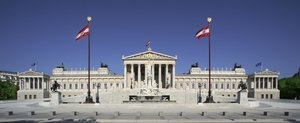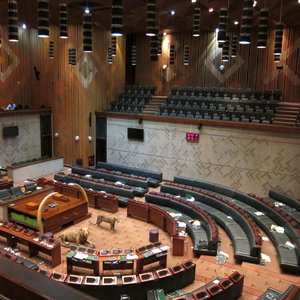Partnering Parliaments
In an increasingly globalized world and its resulting challenges, national parliaments have to adapt to new agendas. It is important that Members of Parliament from all thematic areas dealing with issues pertaining to development policy and development cooperation are getting involved. They are among the main actors responsible for the implementation of the Sustainable Development Goals (SDGs) and thus play a prominent role in the fight against poverty. MPs in donor countries need to be aware of the fact that laws passed by them often have a direct impact on the living conditions of people in the South. On the basis of these aspects and considerations as well as due to the interest of many MPs, the Austrian Parliament initiated a NorthSouth partnership with the Parliament of Zambia.
The cooperation between the Austrian and the Zambian Parliaments contributes in many ways to the achievement of international goals and commitments in the field of development cooperation, not least SDG 16 (peace, justice and strong institutions). The EU Commission recommends new, diplomatic relations as part of the EU-Africa Strategy, such as collaborations between European and African parliaments, towns, communities, businesses, trade unions and civil society organizations (the so-called Twinning Partnerships).
Austria

The Austrian Parliament has two chambers: the National Council with 183 elected representatives and the Federal Council with 61 members appointed by the provincial assemblies. The National Council is elected for a five-year legislative period, by proportional representation, and constitutes the core body of federal legislation. The National Council convenes two to three days a month in plenary sessions. The reports and recommendations of the committees and caucuses form the basis for the decisions of the National Council. Urgent requests provide the opportunity to discuss current topics of general interest in the plenary sessions. At the beginning of the legislative period committees are elected for each major thematic subject. The fractional composition of the committees reflects the majority in the plenary of the National Council. The central task of the committees is the preliminary discussion of agenda items.
Sambia

The National Assembly of Zambia is a unicameral Parliament with 156 Members of Parliament of whom 8 are nominated by the President of Zambia. The Parliament is a hybrid system of the Westminster System and the Presidential System. The legislative arm of the state consists of the President and the National Assembly, in accordance with Article 62 of the Constitution. Parliament is seen as the main forum for political debate and the expression and confrontation of views among MPs. The latest elections were held on 11 August 2016 resulting in the distribution of mandates in the Parliament as follows: 89 Patriotic Front (PF), 63 opposition parties (UPND and MDD), 14 independent. This means that the ruling party has an absolute majority. President Edgar Lungu (PF) was re-elected as president of Zambia. The National Assembly oversees the performance of the executive through a comprehensive and standardized system of committees. Portfolio Committees, headed by backbenchers, are responsible for scrutinizing all sector ministries and departments. They present their reports during special plenary sessions in which the government has to comment to the findings given. Committee meetings are open to the public.

